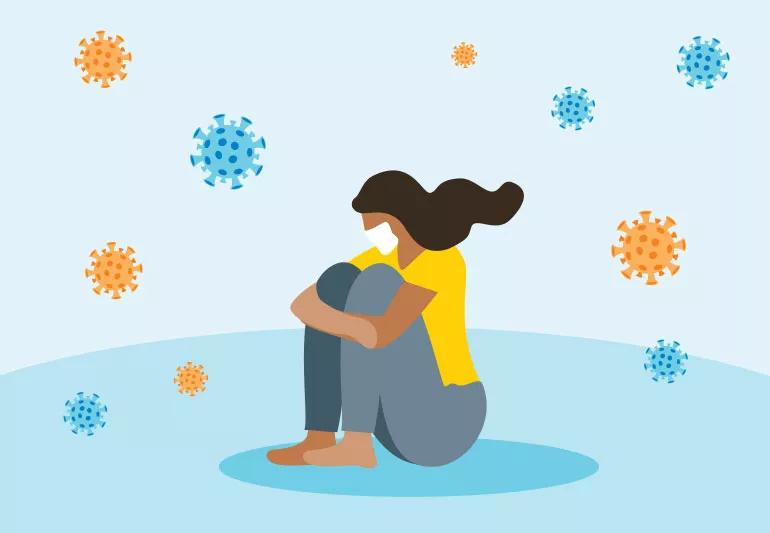Influenza puts stress on your body and can lead to serious conditions like pneumonia or stroke

Image content: This image is available to view online.
View image online (https://assets.clevelandclinic.org/transform/3fa62826-28c2-4734-9b2a-69980159bb7f/flu-dangerous1-1213646192-770x533-1_jpg)
Woman with protective face mask huddling on floor while flu spores float around in the air.
Newer illnesses like COVID-19 may grab headlines, but old-and-familiar ailments such as influenza, or the flu, remain a serious health concern — a fact that many might learn during the upcoming flu season.
Advertisement
Cleveland Clinic is a non-profit academic medical center. Advertising on our site helps support our mission. We do not endorse non-Cleveland Clinic products or services. Policy
For example, in the U.S. from October 1, 2022 through April 30, 2023, the U.S. Centers for Disease Control and Prevention (CDC) estimated that there were 27 to 54 million flu illnesses, with 300,000 to 650,000 flu hospitalizations — and 19,000 to 58,000 deaths related to the flu.
Yet despite those numbers, the flu often gets talked about as if it’s little more than the sniffles. That’s a serious underestimation of the illness, cautions infectious disease specialist Kristin Englund, MD.
“It’s not a common cold,” stresses Dr. Englund. “The flu taxes your body. There’s a lot of stress put on your system as it works to fight off the infection — and that can lead to all sorts of complications.”
So, why is influenza sometimes mislabeled as a cold? Well, the viruses share symptoms such as a cough, fever and an overall cruddy feeling. But with the flu, symptoms often hit harder and last longer.
“Perfectly healthy people can get severe complications from influenza,” says Dr. Englund. “But if you have any underlying health issues, the risk becomes much greater.”
In severe cases, the flu can lead to:
Advertisement
Somewhere between 3% and 11% of the U.S. population — which represents millions upon millions of people — get infected with influenza every year, says the CDC. Most will recover within three to seven days, though some may see symptoms last a few weeks.
But your risk for developing severe flu complications increases if you have:
In addition, people at opposite ends of the age spectrum — those younger than 5 years old or older than 65 — tend to be more vulnerable when it comes to flu-related complications. Ditto for those who are pregnant.
Avoiding the worst that the flu dishes out begins with avoiding the flu … and the most effective way to do that is to get your flu shot, advises Dr. Englund.
The CDC reports that getting a flu vaccine lowers your risk of getting sick by 40% to 60%. During the 2021-2022 flu season in the U.S., influenza vaccinations prevented an estimated:
And even if you do get flu, research shows that a flu shot helps reduce the severity of the illness. A 2021 study found that a flu vaccination lowered the risk of intensive care unit (ICU) admission by 26% and death by 31%.
“It’s a simple shot that’s extraordinarily safe,” states Dr. Englund. “So, why not protect yourself?”
(On a side note, we want to emphasize that the flu shot CANNOT give you the flu.)
Want to keep the flu bug at bay this flu season? Aside from getting your flu shot, consider these tips:
Despite best efforts, it’s still possible you may get the virus. Don’t ignore flu-like symptoms like fever, cough and body aches. Talk to a healthcare provider right away, especially if you’re in a high-risk group.
Advertisement
Quick action could allow you to benefit from antiviral medications, which can lessen flu symptoms and help you bounce back a little more quickly.
The bottom line on the flu? Take it seriously.
“We see so many people in hospitals every year because of influenza,” emphasizes Dr. Englund. “People die from the virus every year, too. It’s not something to ignore, so take the precautions you can to stay healthy.”
Advertisement

Sign up for our Health Essentials emails for expert guidance on nutrition, fitness, sleep, skin care and more.
Learn more about our editorial process.
Advertisement
While it typically starts in October, vaccine effectiveness can affect its duration and severity
Get vaccinated, consider wearing a mask and stock your medicine cabinet
There are three antigenic types of influenza, but A and B are responsible for our flu season
Resting, staying hydrated and taking over-the-counter medicine can help you recover quickly
You can spread the flu to others a day before you feel sick and for several days after
The antiviral medication can help curb symptoms and shorten recovery time
These nutritious foods will help your body to better fight the flu
Colds and the flu are still lurking this winter
Type 2 diabetes isn’t inevitable with these dietary changes
Applying a hot or cold compress can help with pain
Pump up your iron intake with foods like tuna, tofu and turkey